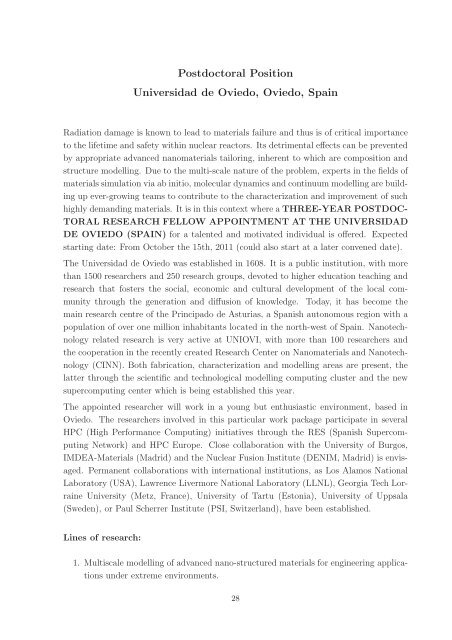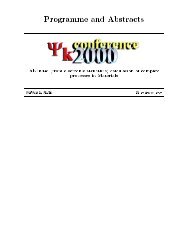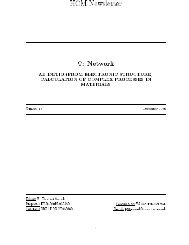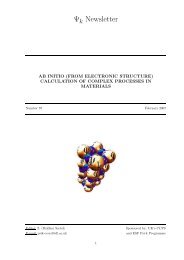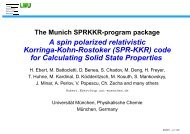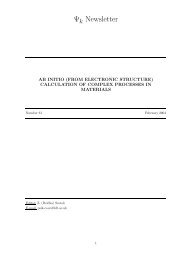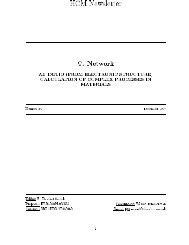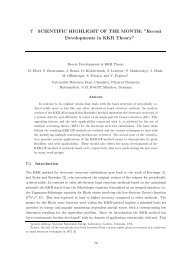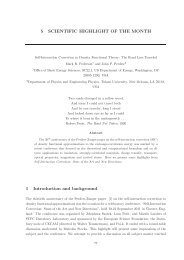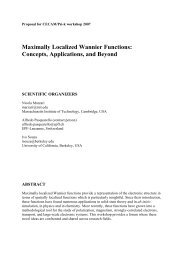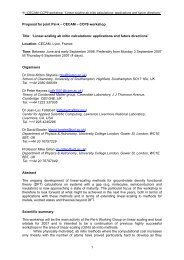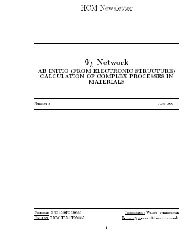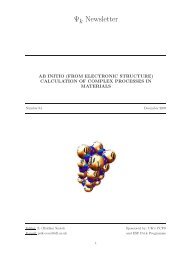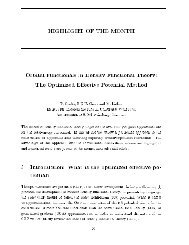Newsletter 107 - October 2011 - (pdf - 0.6 MB) - Psi-k
Newsletter 107 - October 2011 - (pdf - 0.6 MB) - Psi-k
Newsletter 107 - October 2011 - (pdf - 0.6 MB) - Psi-k
You also want an ePaper? Increase the reach of your titles
YUMPU automatically turns print PDFs into web optimized ePapers that Google loves.
Postdoctoral Position<br />
Universidad de Oviedo, Oviedo, Spain<br />
Radiation damage is known to lead to materials failure and thus is of critical importance<br />
to the lifetime and safety within nuclear reactors. Its detrimental effects can be prevented<br />
by appropriate advanced nanomaterials tailoring, inherent to which are composition and<br />
structure modelling. Due to the multi-scale nature of the problem, experts in the fields of<br />
materials simulation via ab initio, molecular dynamics and continuum modelling are building<br />
up ever-growing teams to contribute to the characterization and improvement of such<br />
highly demanding materials. It is in this context where a THREE-YEAR POSTDOC-<br />
TORAL RESEARCH FELLOW APPOINTMENT AT THE UNIVERSIDAD<br />
DE OVIEDO (SPAIN) for a talented and motivated individual is offered. Expected<br />
starting date: From <strong>October</strong> the 15th, <strong>2011</strong> (could also start at a later convened date).<br />
The Universidad de Oviedo was established in 1608. It is a public institution, with more<br />
than 1500 researchers and 250 research groups, devoted to higher education teaching and<br />
research that fosters the social, economic and cultural development of the local community<br />
through the generation and diffusion of knowledge. Today, it has become the<br />
main research centre of the Principado de Asturias, a Spanish autonomous region with a<br />
population of over one million inhabitants located in the north-west of Spain. Nanotechnology<br />
related research is very active at UNIOVI, with more than 100 researchers and<br />
the cooperation in the recently created Research Center on Nanomaterials and Nanotechnology<br />
(CINN). Both fabrication, characterization and modelling areas are present, the<br />
latter through the scientific and technological modelling computing cluster and the new<br />
supercomputing center which is being established this year.<br />
The appointed researcher will work in a young but enthusiastic environment, based in<br />
Oviedo. The researchers involved in this particular work package participate in several<br />
HPC (High Performance Computing) initiatives through the RES (Spanish Supercomputing<br />
Network) and HPC Europe. Close collaboration with the University of Burgos,<br />
IMDEA-Materials (Madrid) and the Nuclear Fusion Institute (DENIM, Madrid) is envisaged.<br />
Permanent collaborations with international institutions, as Los Alamos National<br />
Laboratory (USA), Lawrence Livermore National Laboratory (LLNL), Georgia Tech Lorraine<br />
University (Metz, France), University of Tartu (Estonia), University of Uppsala<br />
(Sweden), or Paul Scherrer Institute (PSI, Switzerland), have been established.<br />
Lines of research:<br />
1. Multiscale modelling of advanced nano-structured materials for engineering applications<br />
under extreme environments.<br />
28


